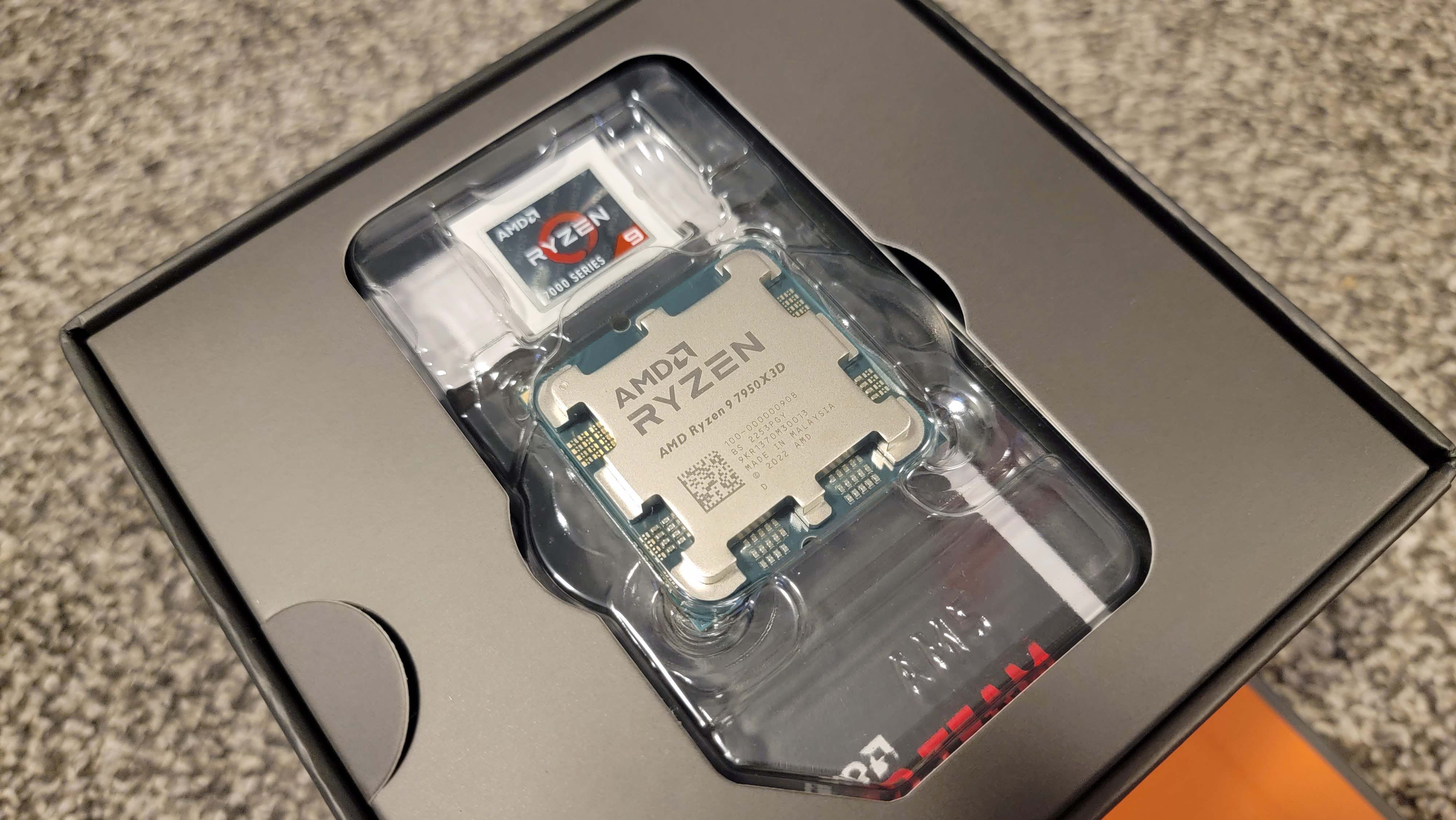Why you can trust Tom's Hardware
AMD’s innovative 3D V-Cache technology comes to the Zen 4 architecture in a big way with the $699 Ryzen 9 7950X3D that lives up to its billing as the fastest gaming chip in the world, beating out Intel’s flagships by massive margins in some games and taking home the overall gaming win.
AMD’s new innovative multi-chiplet 3D V-Cache design is an engineering feat that, tightly coupled with driver optimizations, brings the best of this tech’s gaming potential to higher core count processors while preserving most of that standard model’s performance in productivity apps.
Overall, AMD's second-gen 3D V-Cache technology takes the company's chiplet-based design methodology, which uses an older and less-expensive process node in tandem with expensive new process tech, into the third dimension by leveraging the now-mature and less-expensive 7nm process node to boost the performance of its cutting-edge 5nm compute die.
However, the Ryzen 9 7950X is a specialized chip optimized specifically for gaming, so it trails Intel’s competing Core i9 processors in some productivity applications. Below, we have the geometric mean of our gaming test suite at 1080p and 1440p and a cumulative measure of performance in single- and multi-threaded applications. We conducted our gaming tests with an Nvidia RTX 4090, so performance deltas will shrink with lesser cards and higher resolution and fidelity settings.
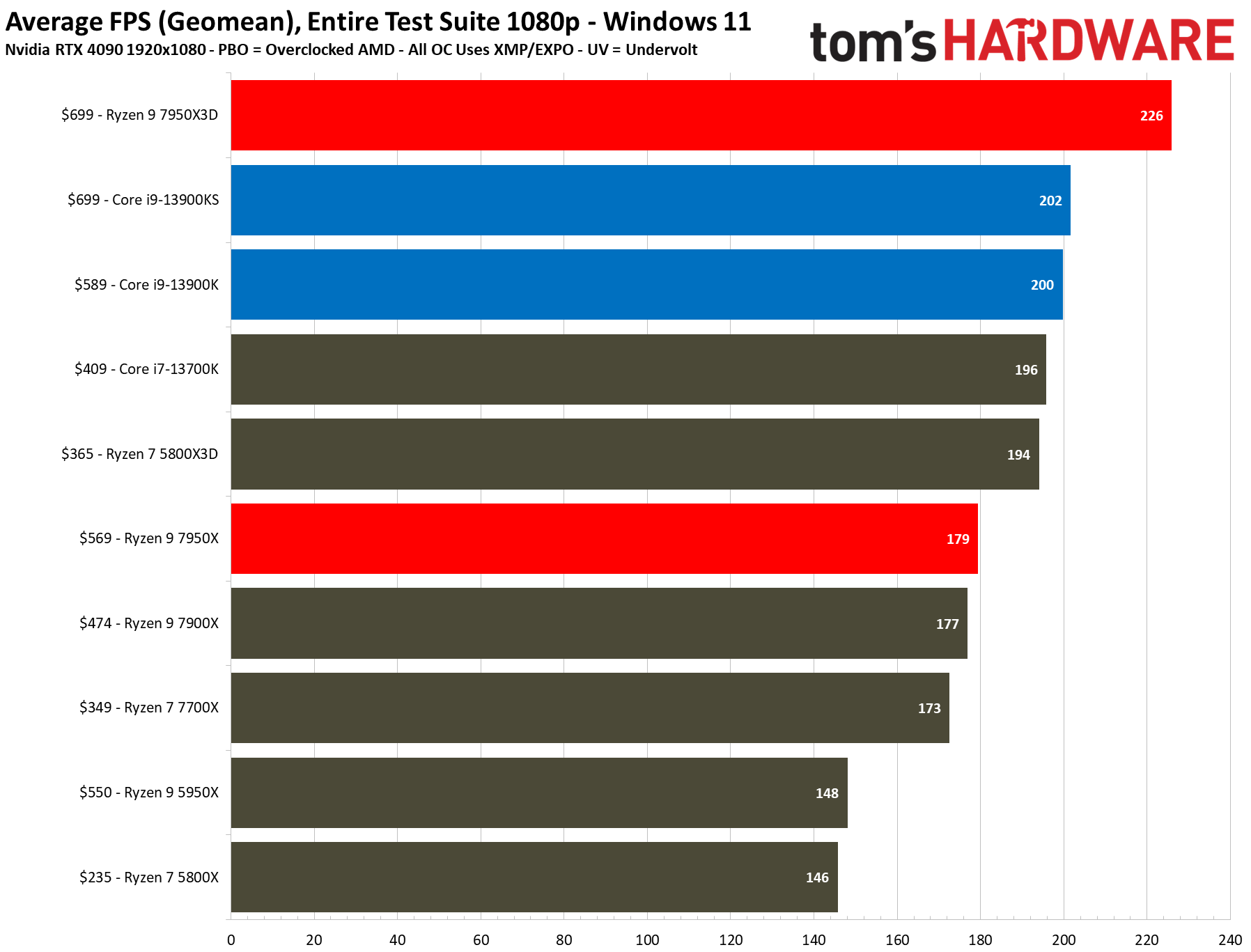
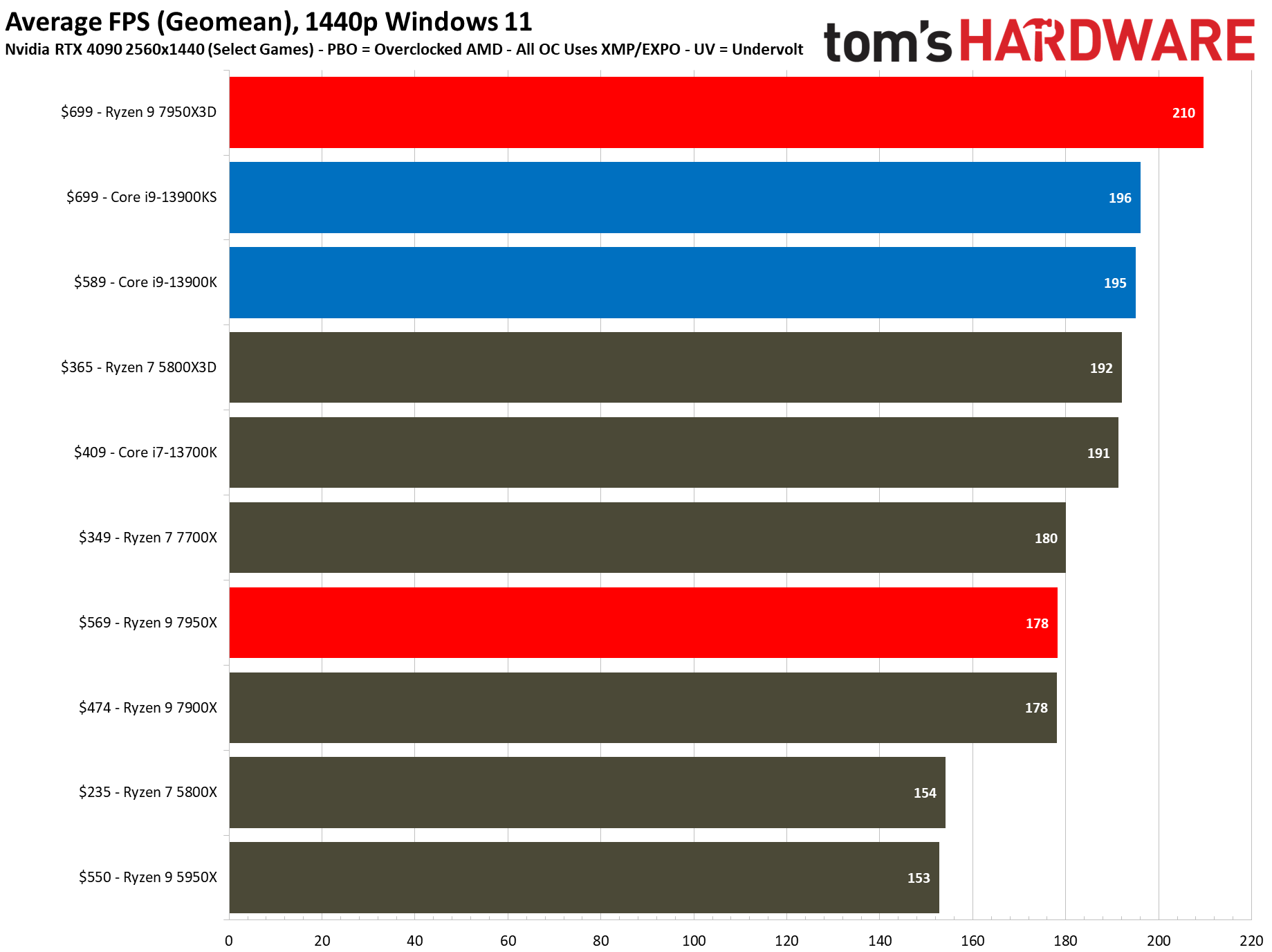
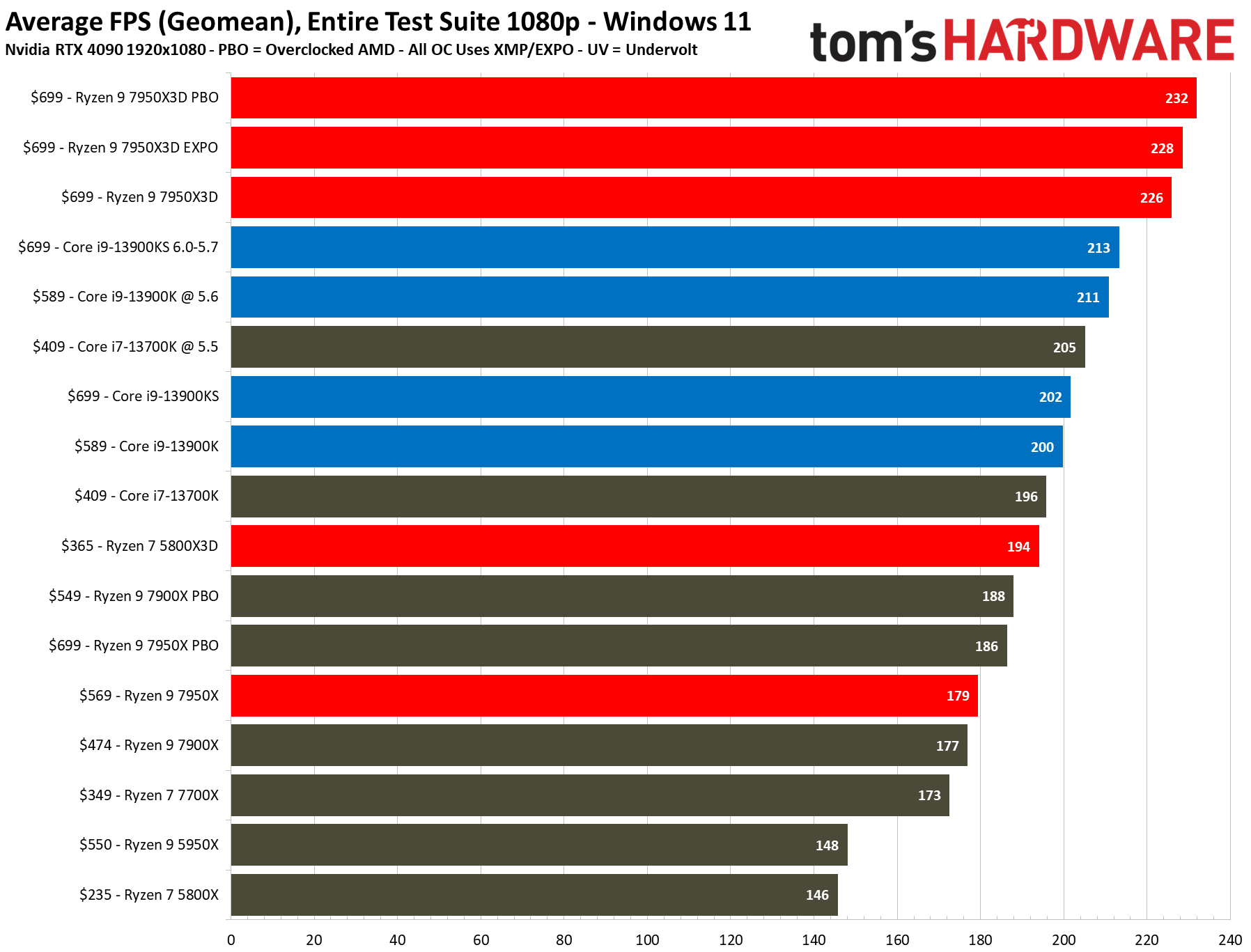
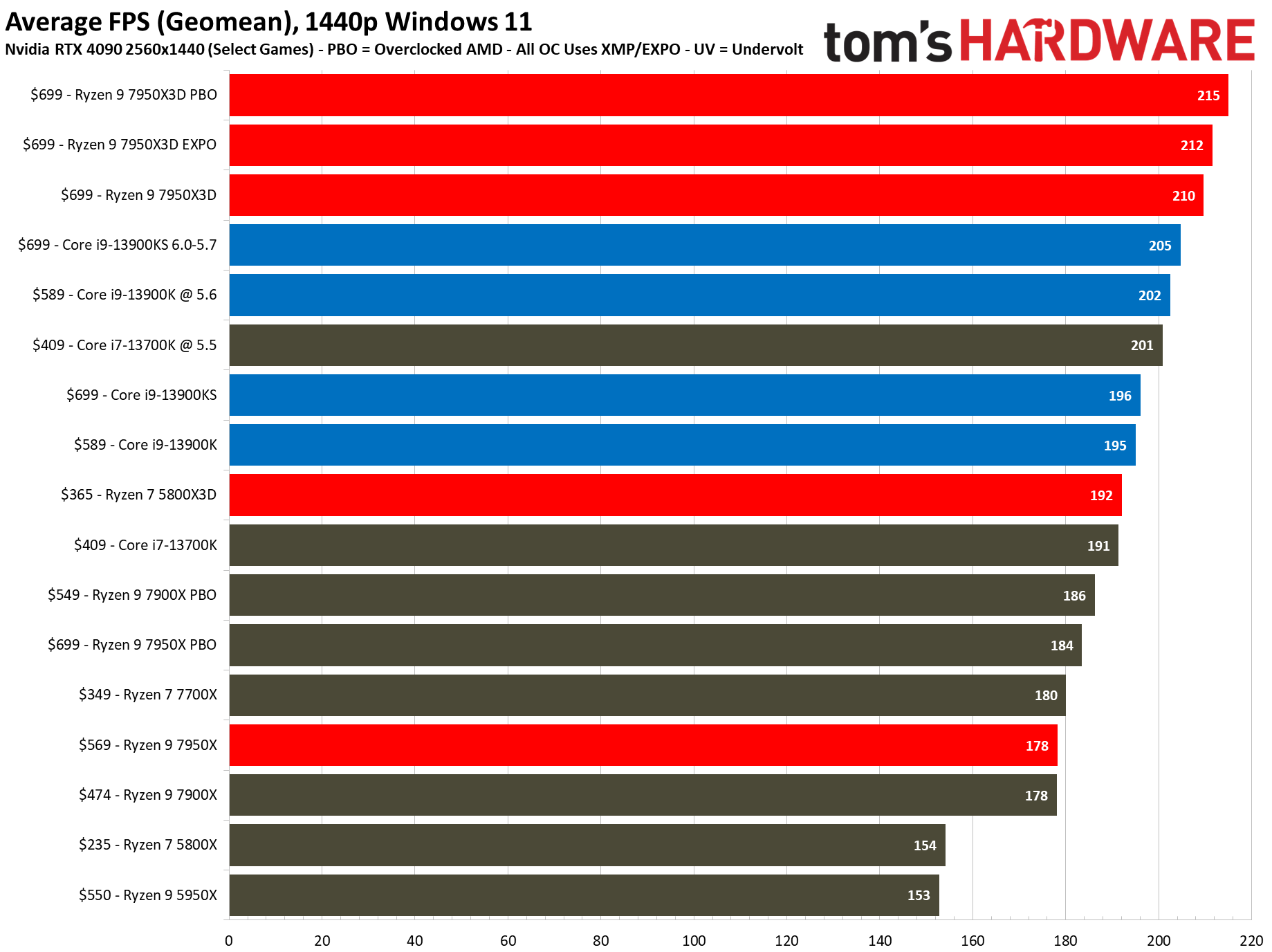
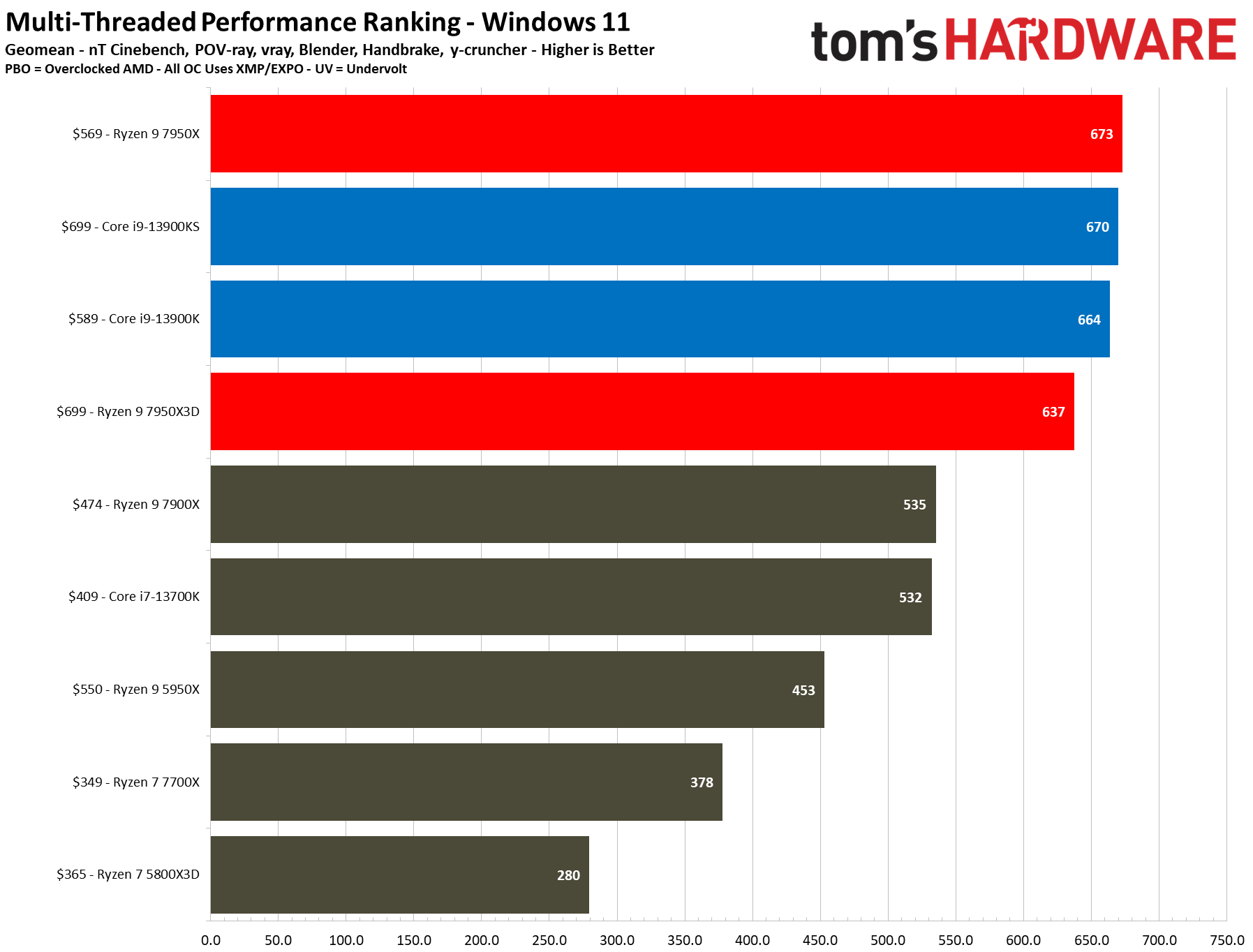
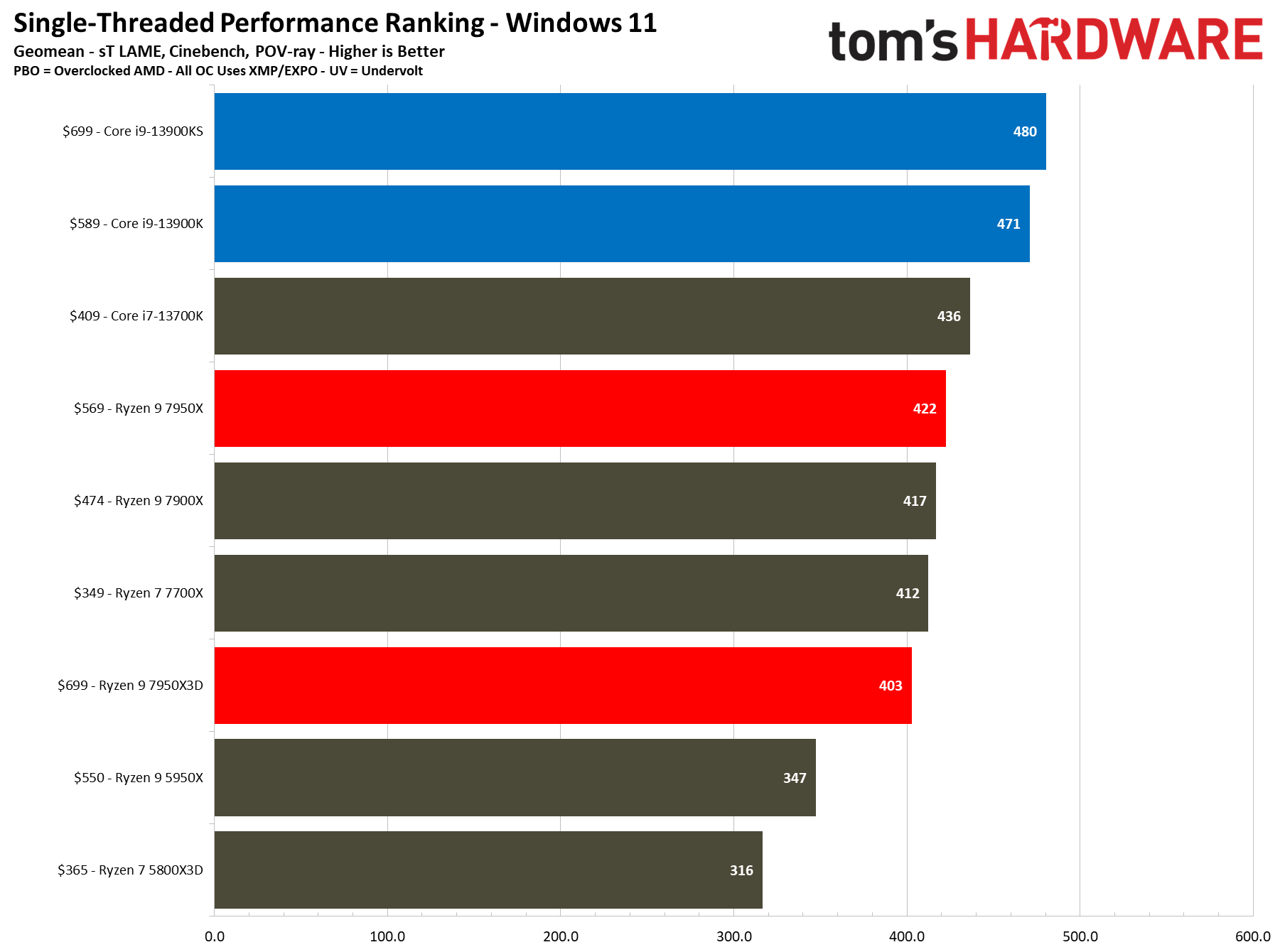
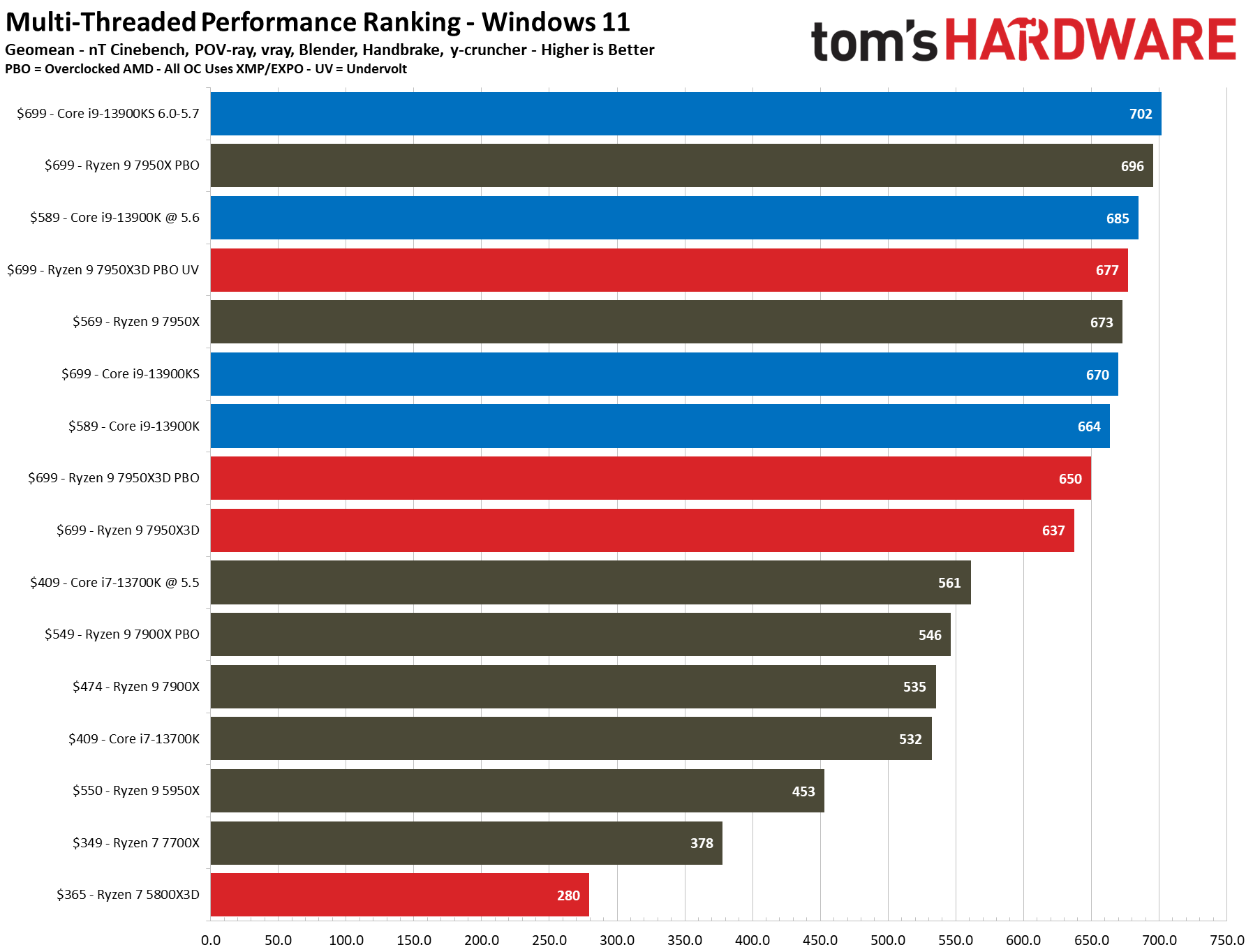
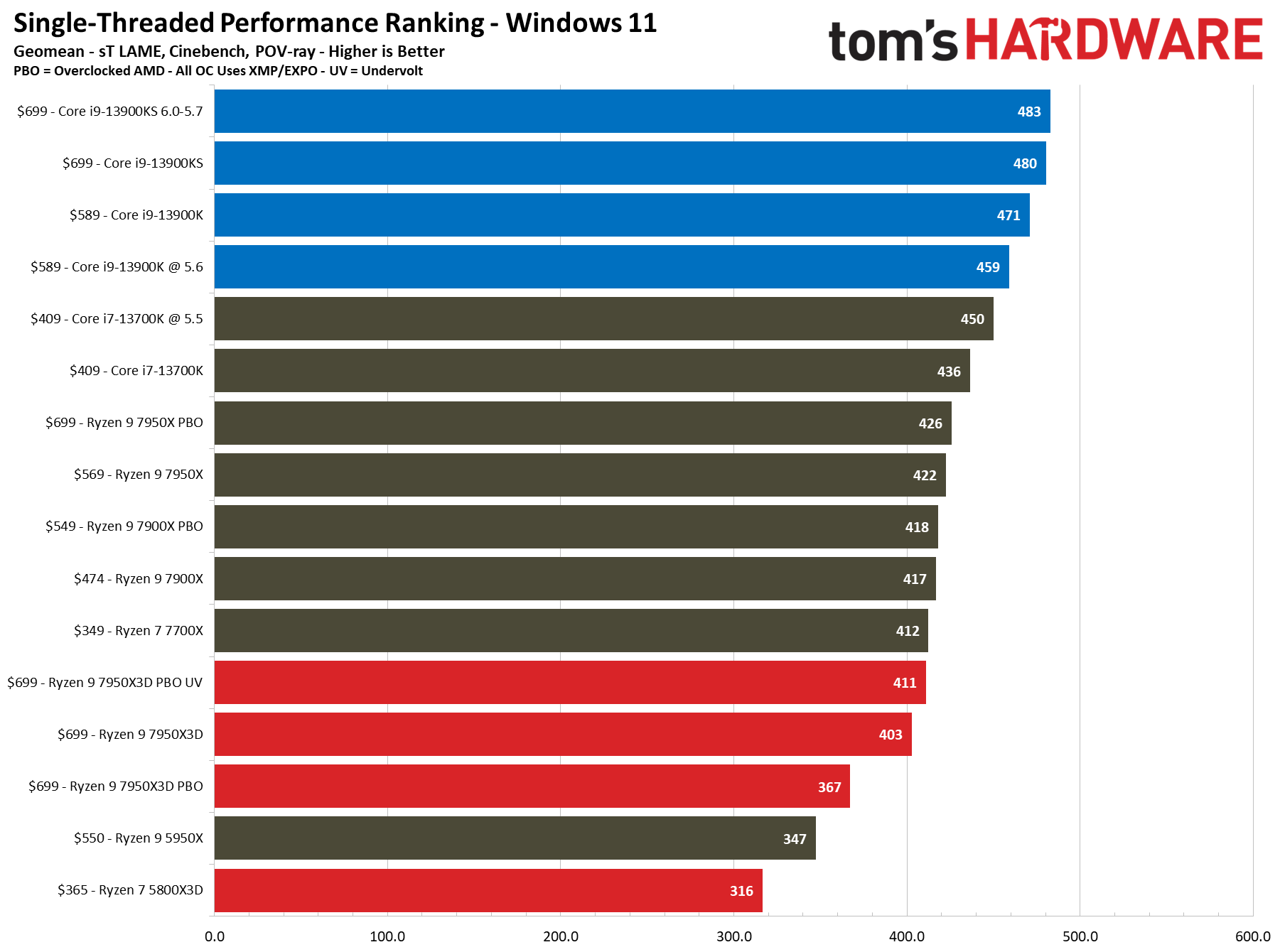
The first slides are simplified with no overclocking configs, while the remainder contains the full roster of tested configurations. The $699 Ryzen 9 7950X3D is 12% faster at 1080p gaming than the $589 Core i9-13900K and $699 Core i9-13900KS, and 9% faster when the chips are overclocked. These are cumulative measurements, though, and the 3D V-Cache doesn’t accelerate all titles equally — you’ll need to check our individual game benchmarks on the preceding pages to make an informed decision based on your workload.
While AMD has preserved the lion’s share of performance in productivity applications despite the thermal and power limitations of the 3D-stacking tech, the 7950X3D isn’t as competitive against the Core i9 contenders and the vanilla Ryzen 9 7950X in those tasks. The Core i9-13900K is 17% faster than the standard Ryzen 9 7950X3D configuration in single-threaded productivity work and 4% faster in threaded applications. Undervolting the 7950X3D and dialing up the memory to DDR5-6000 helps level the playing field, narrowing the 13900K’s lead in single-threaded work to 11% and a mere 1% in threaded work. The 7950X3D also isn't quite as fast as the standard 7950X, which is 6% faster in threaded apps and 5% faster in single-threaded work.
The Ryzen 9 7950X3D is incredibly power efficient, drawing far less power than either the standard 7950X or the competing Core i9-13900KS, thus delivering superb power efficiency that ranks among the best we’ve ever tested. That means you’ll ultimately benefit from a cooler, quieter system. The chips also drop into AM5 motherboards that support the latest connectivity tech, like PCIe 5.0 and DDR5, and AMD plans to support the platform until 2025+. In contrast, Intel’s current round of motherboards will only support one more generation of chips, so upgradeability remains an advantage for AMD.
Overall, AMD has done an amazing engineering job in bringing thermals under control well enough to deliver a 16-core chip with 3D-stacking tech that provides excellent performance within an acceptable TDP threshold. Combining both a bare chiplet and a 3D-stacked chiplet is an ingenious design that helps provide the best of both worlds in a diverse range of workloads. The driver implementation also works well to optimize the system for different usages on the fly while also leaving plenty of room for end-user configuration. This optimization is all automatic, which is much better than the Threadripper Game Mode toggle that AMD used in the past.
AMD’s decision to bring 3D V-Cache to its dual-CCD chips creates an unbeatable high core-count monster in gaming, but it also inevitably results in reduced performance in the content creation applications befit of such a well-appointed and expensive processor.
As such, the Ryzen 9 7950X finds itself at an interesting place in the market. Most dedicated gamers aren’t interested in a $699 processor for gaming — they’ll wait for the eight-core Ryzen 7 7800X3D that will likely offer nearly the same amount of gaming performance as the 7950X3D. As usual, we don’t recommend a chip at this price point for most gamers — you’ll find nearly the same performance with the more affordable Ryzen 7 7800X3D that arrives in April.
Meanwhile, productivity-focused users might turn to faster chips in standard applications, or step down to the $599 12-core Ryzen 9 7900X3D. However, much of the decision-making process will ultimately hinge on how the 7950X3D’s pricing lands at retail — AMD’s chips always sell for much lower than the suggested pricing a few months after their debut.
For now, the second-gen 3D V-Cache tech comes with a hefty premium and won’t appeal to those looking for the best price-to-performance ratio for gaming. However, we saw the previous-gen 5800X3D drop to amazingly low pricing over time, and the 7950X3D is faster in gaming than Intel’s competing 6 GHz Core i9-13900KS that retails for the same suggested $699 pricing. There will always be a subset of users determined to build the absolutely fastest gaming system, regardless of cost, and the Ryzen 9 7950X3D is undoubtedly the fastest gaming chip currently available for those high-end builds.
- MORE: Best CPU for gaming
- MORE: CPU Benchmark Hierarchy
- MORE: Intel vs AMD
- MORE: How to Overclock a CPU
Get Tom's Hardware's best news and in-depth reviews, straight to your inbox.
Current page: Taking a Bite Out of Raptor Lake
Prev Page AMD Ryzen 9 7950X3D Productivity Benchmarks
Paul Alcorn is the Editor-in-Chief for Tom's Hardware US. He also writes news and reviews on CPUs, storage, and enterprise hardware.
-
PlaneInTheSky ReplySteep pricing
The cons just weigh too heavy for me to even consider the CPU or the AM5 platform.
No support for DDR4 memory
Reduced performance in some productivity apps
I already have DDR4. AMD expects me to just throw this into the trash and buy expensive new DDR5 for a 1% difference in performance. It even bothers me from an e-waste perspective, let alone the financial cost.
The fact performance of X3D CPU is all over the place bothers me too. Yes it's fast in -some- games, but then you get less overall performance in several important applications. If I just used my PC for gaming, I would have bought a console, I don't like the idea of having to make a trade-off with X3D CPU.
Another thing is, and this is not AMD specific but PC specific. The biggest issue with gaming on PC has been stuttering because shaders need to be runtime compiled on PC. This CPU will not solve this. When PC gaming becomes a meme, #stutterstruggle, I don't think many people are going to be willing to invest in $600+ CPU. Solve this problem, PC gaming is currently in shambles. -
cknobman Every single media outlet beating the "DDR5 cost" dead horse over and over again.Reply
When talking about ultimate gaming performance, which these 3D chips are designed for, saying the platform cost of DDR5 is a negative is stupid.
DDR4 is a dead end and should only be considered for budget builds and upgrades on older systems at this point.
Just let the "platform cost" argument go, otherwise test Intel with DDR4 and make proper comparisons showing what you get going with older and slower technology. -
PEnns Wow, AMD is for once forcing users to upgrade to new hardware.......and DDR5! How horrible!!Reply
I heard that lame story so many times before, Intel does it every 2-3 years!!! -
drivinfast247 Reply
I don't think they're targeting you specifically. No need to upgrade if not needed. Don't forget there's other people whom may be building their first PC or upgrading from a very old platform and the performance increase will be astronomical.PlaneInTheSky said:The cons just weigh too heavy for me to even consider the CPU or the AM5 platform.
I already have DDR4. AMD expects me to just throw this into the trash and buy expensive new DDR5 for a 1% difference in performance. It even bothers me from an e-waste perspective, let alone the financial cost.
The fact performance of X3D CPU is all over the place bothers me too. Yes it's fast in -some- games, but then you get less overall performance in several important applications. If I just used my PC for gaming, I would have bought a console, I don't like the idea of having to make a trade-off with X3D CPU.
Another thing is, and this is not AMD specific but PC specific. The biggest issue with gaming on PC has been stuttering because shaders need to be runtime compiled on PC. This CPU will not solve this. When PC gaming becomes a meme, #stutterstruggle, I don't think many people are going to be willing to invest in $600+ CPU. Solve this problem, PC gaming is currently in shambles.
Curious as to what games are struggling to run on PC and also what PCs are struggling to run games? Also, are those affected games also having issues on consoles?
My PC runs every game that I play without issues. And with the recent GPU upgrade I'll be happy for another year or so and will upgrade when needed. -
Elusive Ruse Reply
Ah cut the crap will you?PlaneInTheSky said:The cons just weigh too heavy for me to even consider the CPU or the AM5 platform.
I already have DDR4. AMD expects me to just throw this into the trash and buy expensive new DDR5 for a 1% difference in performance. It even bothers me from an e-waste perspective, let alone the financial cost.
The fact performance of X3D CPU is all over the place bothers me too. Yes it's fast in -some- games, but then you get less overall performance in several important applications. If I just used my PC for gaming, I would have bought a console, I don't like the idea of having to make a trade-off with X3D CPU.
Another thing is, and this is not AMD specific but PC specific. The biggest issue with gaming on PC has been stuttering because shaders need to be runtime compiled on PC. This CPU will not solve this. When PC gaming becomes a meme, #stutterstruggle, I don't think many people are going to be willing to invest in $600+ CPU. Solve this problem, PC gaming is currently in shambles.
You have no intention of upgrading to anything, you have admitted it before. All you do here is dump on new tech because for some reason you cannot deal with change. You have an axe to grind when it comes to AMD and anything that puts your fossil of a setup into perspective.PlaneInTheSky said:My PC from 14 years ago still browses the internet just fine. It still does Spotify, Netflix, indie gaming, etc.
At some point your average PC became "good enough" for most tasks.
This is starting to happen with PC gaming too. While AAA developers still bother to spend years making "uber graphics", most developers have long stopped with this rat race because better graphics rarely translates to better sales.
-
Elusive Ruse Reply
Especially considering that Intel's 13th gen would take a massive performance plunge if paired with DDR4.cknobman said:Every single media outlet beating the "DDR5 cost" dead horse over and over again.
When talking about ultimate gaming performance, which these 3D chips are designed for, saying the platform cost of DDR5 is a negative is stupid.
DDR4 is a dead end and should only be considered for budget builds and upgrades on older systems at this point.
Just let the "platform cost" argument go, otherwise test Intel with DDR4 and make proper comparisons showing what you get going with older and slower technology.
It is intellectually disingenuous to put lack of DDR4 support as a con here, if only for the reason that it has already been established that AM5 doesn't support it. Is Tom's Hardware going to put "Lack of DDR4 support" as a con for every CPU that comes out from now on? -
lmcnabney Excellent article.Reply
I noted that Paul mentioned AMD's specification to use water-cooling on the X3D lineup. After noting the low power usage of these chips I am curious as to why. Has the chip been tested using a more typical air cooled tower fan (with both standard, PBO, and PBO-UV) to determine if water-cooling is even necessary? -
Elusive Ruse Reply
According to AMD, V-cache is sensitive to heat; that's why they decreased the TjMax to 89c and reduced the TDP as well. I assume that's also why they instructed reviewers to use water-cooling.lmcnabney said:Excellent article.
I noted that Paul mentioned AMD's specification to use water-cooling on the X3D lineup. After noting the low power usage of these chips I am curious as to why. Has the chip been tested using a more typical air cooled tower fan (with both standard, PBO, and PBO-UV) to determine if water-cooling is even necessary? -
Alvar "Miles" Udell 13% faster in games at 1920x1080 comparing stock to stock for 20% more money (or 25% if using the current discount)...that's proper gamer logic for sure.Reply
If anything it's an advertisement for the 5800x3d. 16% slower at 1920x1080 yet only 44% of the price, plus the platform cost is far cheaper and all you sacrifice is PCIe 5.0.
